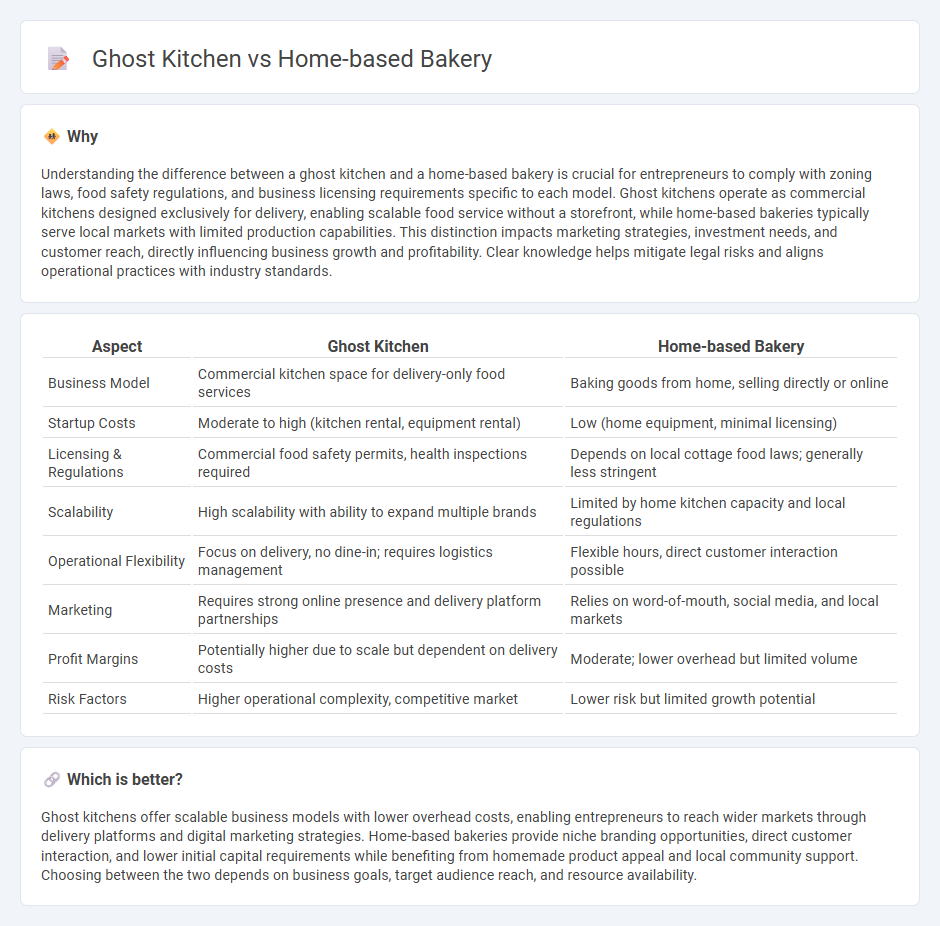
Ghost kitchens leverage commercial kitchen spaces to efficiently fulfill delivery-only food orders, while home-based bakeries operate from private residences focusing on artisanal baked goods with lower overhead costs. The scalability and marketing reach of ghost kitchens often surpass home-based bakeries, which rely on local networks and word-of-mouth promotion. Explore the unique advantages and challenges of both models to find the best fit for your entrepreneurial goals.
Why it is important
Understanding the difference between a ghost kitchen and a home-based bakery is crucial for entrepreneurs to comply with zoning laws, food safety regulations, and business licensing requirements specific to each model. Ghost kitchens operate as commercial kitchens designed exclusively for delivery, enabling scalable food service without a storefront, while home-based bakeries typically serve local markets with limited production capabilities. This distinction impacts marketing strategies, investment needs, and customer reach, directly influencing business growth and profitability. Clear knowledge helps mitigate legal risks and aligns operational practices with industry standards.
Comparison Table
| Aspect | Ghost Kitchen | Home-based Bakery |
|---|---|---|
| Business Model | Commercial kitchen space for delivery-only food services | Baking goods from home, selling directly or online |
| Startup Costs | Moderate to high (kitchen rental, equipment rental) | Low (home equipment, minimal licensing) |
| Licensing & Regulations | Commercial food safety permits, health inspections required | Depends on local cottage food laws; generally less stringent |
| Scalability | High scalability with ability to expand multiple brands | Limited by home kitchen capacity and local regulations |
| Operational Flexibility | Focus on delivery, no dine-in; requires logistics management | Flexible hours, direct customer interaction possible |
| Marketing | Requires strong online presence and delivery platform partnerships | Relies on word-of-mouth, social media, and local markets |
| Profit Margins | Potentially higher due to scale but dependent on delivery costs | Moderate; lower overhead but limited volume |
| Risk Factors | Higher operational complexity, competitive market | Lower risk but limited growth potential |
Which is better?
Ghost kitchens offer scalable business models with lower overhead costs, enabling entrepreneurs to reach wider markets through delivery platforms and digital marketing strategies. Home-based bakeries provide niche branding opportunities, direct customer interaction, and lower initial capital requirements while benefiting from homemade product appeal and local community support. Choosing between the two depends on business goals, target audience reach, and resource availability.
Connection
Ghost kitchens and home-based bakeries share a foundation in low-overhead entrepreneurship, enabling food businesses to operate without traditional storefronts. Both models leverage digital platforms for orders and marketing, maximizing reach while minimizing fixed costs. This synergy fosters innovation in food delivery and accessibility, expanding opportunities for aspiring entrepreneurs.
Key Terms
Location Flexibility
Home-based bakeries offer unparalleled location flexibility, as bakers can operate from their own residences without the need for commercial rental spaces. Ghost kitchens, while also providing flexible location options, typically require a commercial kitchen space that can be strategically placed to optimize delivery logistics and customer reach. Explore the advantages of each option to find the best fit for your baking business needs.
Licensing Requirements
Home-based bakeries typically require basic food handler permits, health department inspections, and compliance with local cottage food laws that regulate ingredient types and sales channels. Ghost kitchens must obtain commercial kitchen licenses, meet rigorous health and safety standards, and secure appropriate business permits for food preparation and delivery operations. Explore detailed licensing criteria to ensure your baking venture meets all legal standards.
Customer Access
Home-based bakeries often rely on local word-of-mouth and social media platforms for customer access, limiting their reach to neighborhood and community buyers. Ghost kitchens leverage multiple online delivery apps and optimized logistics to serve a broader urban customer base efficiently. Explore the unique advantages of each model to determine the best fit for your bakery business.
Source and External Links
How to Start a Bakery Business from Home - Escoffier - This guide explains key steps to launch a home-based bakery, including planning your menu with shelf-stable items, understanding local laws, and having the flexibility to adapt your baked goods based on customer feedback.
How to Start a Home/Micro Bakery Business in 2025 - Ultimate Guide! - It describes three phases of starting a home bakery business, starting from baking for friends and family to scaling up, including tips on direct sales to local businesses for steady income.
10 Small Business Ideas for Home Bakers | CO - Lists creative bakery business ideas like allergy-friendly baked goods and emphasizes the importance of complying with varied licensing and permitting regulations by state for home bakers.
 dowidth.com
dowidth.com